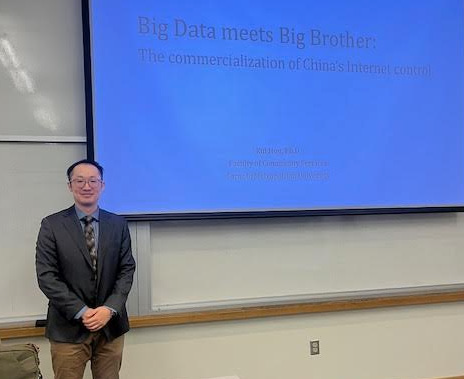
On Monday April 15 in KJ 102, Professor Rui Huo of Queen’s University gave a talk on “The Commercialization of Internet Control in China.” Huo is a PhD candidate in the Department of Sociology at Queen’s University, and his research focuses on the collaboration of politics, social sciences, internet surveillance and the market. Huo has focused his research on China’s internet surveillance industry, information censorship policies and the social credit system. His newest project is investigating how digital technology impacts the delivery of mental health care.
In his talk, Rui Huo explored how modern authoritarian regimes can utilize technology to further their political interests. Huo explained how the recent development of “big data” has greatened the Chinese government’s ability to control its citizens through the internet. As this was a sociology talk, Huo also discussed the mediating social variables which impact the implementation of technology in these regimes. He delved into technology and has become such a natural part of Chinese society that it has altered general perceptions.
He began by discussing the collaboration between market and state actors in the market of technology in China. These external market actors have played a significant role in commercializing authoritarian control. “There is a lively market for which for-profit organizations are selling various data products to the government,” said Huo.
Commercialization of internet control has become a mechanism by which market actors can profit by selling information and the state can legally obtain access to personal information. “The process of integrating control activity into commerce, making it available on the market and authoritarian governments can purchase these control relevant services from market actors into formal contractual agreements and my work further identifies the three sub mechanisms of commercialization,” continued Huo.
The three main pillars which describe the state-market collaboration that has enabled technology to have such an imposing role in citizens’ lives are commodification, commercialization and institutionalization. The first, commodification, explains how digital technologies can create control products which can be produced on a wide scale and frequently updated, along with being more affordable to a larger audience. He explained how “here the real commodity [technology] can be freely purchased by any client.” Legitimization, the second pillar, is how the market actors enabling the government’s repression through commercializing their technology are socially acceptable and respected in China. Huo explained how these actors and their practices are considered “Desirable and appropriate within some socially constructed system of norms, values, beliefs and damnations.” Large scale companies in China have gained legitimacy and moral authority, putting them in position to collaborate with the state without facing public criticism or scrutiny.
Huo explained how authoritarian practices are normalized so they happen under the nose of citizens because “all of these engaged market actors are the real legitimate technology companies.” This differs from other types of repression because, according to Huo, “In other types of third party repression, using the example of if a government hires thugs or a private military to repress people happens under the radar because the government does not want people to know what they are doing so they have other people do the dirty work.” Huo discussed the language and word choice which companies and the government use to frame their actions in a positive and moral way. For example, instead of framing information manipulation in honest terms, the government would call it “optimizing opinion relevance.”
The third mechanism of this state-market collaboration is institutionalization. “Institutionalization is a process by which personal expectations and values tend to form a collective and a repeated pattern to hire and order political rulers,” said Huo. He explained how these repeated practices of internet surveillance and technological imposition have become ingrained in China’s official political and market system: “In terms of internet villains, this kind of commercialization like purchasing surveillance services has become a busy and fundamental element of China’s formal political system.”
Huo delved into his fears about the potential globalization of these practices on the same level as China. Huo voiced concern that companies in other countries may begin to imitate these practices, subjecting other countries’ governments to the whim of private market actors. The active and fast-spreading nature of technology into authoritative control institutions means that “This kind of mechanism can become a global issue with the help of commercialization and government outsourcing,” said Huo. He concluded by discussing the potential benefits and the dangerous drawbacks of state-market collaboration.
























